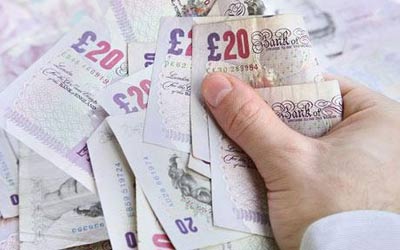|
 Handling money could prevent or cure pain, scientists suggests. |
|
Handling a wad of cash may be as good at killing pain than ibuprofen or aspirin, a new study suggests. Researchers at the University of Minnesota carried out a series of studies which revealed those who counted money before taking part in an experiment where they were subjected to low levels of pain felt less discomfort than those who did not. It thought thatfondling notes and coins helps ward off pain by boosting feelings of self-worth and self-sufficiency. Previous studies have shown those with a greater sense of self-worth may be more likely to withstand pain. Britain spends at least £500 million a year on over-the-counter painkilling pills and the figure is increasing every year. But scientists remain baffled by why some people appear to feel pain more easily than others. In the latest study, a group of students were asked to count out a wad of cash consisting of 80 one-hundred dollar bills, or just 80 slips of blank paper. They had been told researchers were simply testing their dexterity in handling the notes. Each volunteer was then asked to dip their hands into a bowl of very hot water, to see how painful they found it and how long they could last. The results, published in a recent edition of the journal Psychological Science, showed those who had handled money reported less pain and lasted longer. The results support other studies highlighting how the brain can be tuned to ward off pain without the use of pills. A University of Los Angeles team of scientists found just looking at a photograph of a loved one can also be a powerful form of pain relief. They recommended anyone visiting hospital for painful tests or examinations should bring a picture to help them cope. And patients who have had major surgery, such as a knee or hip replacement, can halve the amount of painkilling medicine they need simply by stroking a pet, according to tests at Loyola University in Chicago. (Read by Renee Haines. Renee Haines is a multimedia journalist at the China Daily Web site.) (Agencies) |
一项最新研究表明,数钞票的止痛效果堪比布洛芬或阿司匹林等止痛药物。 明尼苏达大学的研究人员开展了一系列研究,他们让研究对象在参加一项承受轻度疼痛的实验前数钱,结果发现这些人比之前没数钱的人感到的痛感轻。 研究认为,数钱能带来自我价值感和自我满足感,从而有助于止痛。 此前的研究显示,那些自我价值感较高的人承受疼痛的能力更强。 英国每年在非处方止痛药物上的花费至少为5亿英镑,而且这一数字还在逐年增加。 但科学家仍不明白为什么有些人似乎比其他人更容易感觉到疼痛。 在这项最新的研究中,研究人员让一组学生数一叠80张100美元的钞票或80张空白的纸片,并告诉他们这只是为了测试他们点钞的熟练程度。 接下来研究人员让每位志愿者把手浸入一碗很烫的开水中,以观察他们感到的疼痛程度,以及能够坚持多久。 这一在最新一期《心理科学》期刊上发表的研究报告显示,那些之前数过钱的人感到的疼痛较轻,且坚持得更久。 这一结果为其他一些强调在不用止痛药的情况下通过调控大脑来止痛的研究提供了支持。 洛杉矶大学的一组科研人员发现,看看自己所爱的人的照片也能有效缓解疼痛。 他们建议,去医院进行痛苦的身体检查的人应该带一张这样的照片来帮助自己缓解疼痛。 芝加哥洛约拉大学所做的测试发现,那些做了膝关节或髋关节置换术等大手术的病人只需摸摸宠物就能让止痛药的用量减半。 相关阅读 (中国日报网英语点津 陈丹妮 编辑蔡姗姗) |
|
Vocabulary: ibuprofen: a drug used to reduce pain and inflammation 布洛芬,异丁苯丙酸(镇痛消炎药) fondle: touch or stroke lightly in a loving or endearing manner 抚弄 ward off: prevent from affecting you or harming you 避开 over-the-counter: (of drugs and medicines) that can be obtained without a prescription(药品)无需处方可买到的;非处方的 count out: 点数,逐一地数 wad: a thick pile of pieces of paper, paper money, etc. folded or rolled together (纸张、钞票等的)卷,沓,捆 |
